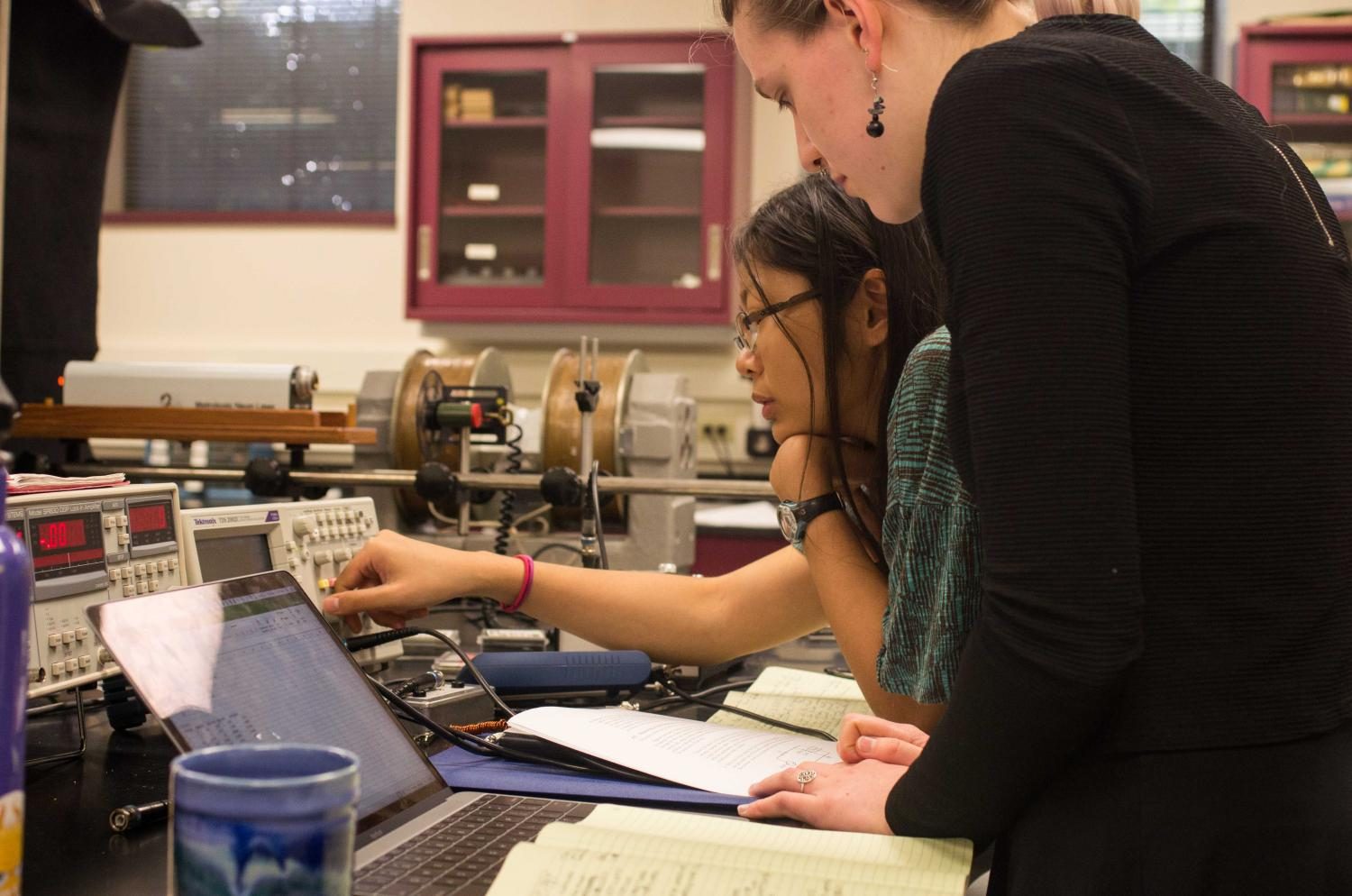Administration Revives Research Status
Photo by Hugh Newcomb, Photo Editor
Alex Vera, OC ’17, conducts research in Associate Professor of Chemistry Jason Belitsky’s lab.
September 8, 2017
Research Status, a program that awards grants to Oberlin Faculty, giving them the opportunity to conduct research on a full-time basis for a period of up to one year, is being reinstated in a more limited form this semester. The decision comes after a controversial announcement last semester that the Research Status program was being suspended indefinitely in a move to reduce Oberlin’s spending.
Dean of the College of Arts and Sciences Tim Elgren and Dean of the Conservatory Andrea Kalyn emailed faculty in March to inform them of the suspension. While the email was ostensibly sent to save faculty the time of filling out applications for Research Status over spring break, many felt rushed in the decision-making process.
“Email was flying among faculty members during spring break last year trying to figure out how did this decision happen; who really made this decision; is it really a final decision?” Mathematics Professor Jeff Witmer said. “Although I appreciate the desire to get something done in a timely fashion because spring break was coming up and you don’t want people to waste their time if the program is going away, the announcement could have been handled in a better way.”
Immediately, faculty pushed back against the potential elimination of a program that many feel is integral to Oberlin’s mission.
“It was read by many people as a signal from the administration that they suddenly started valuing our scholarship less,” said Professor and Chair of Hispanic Studies Sebastiaan Faber. “And we thought, ‘Well, that’s not right, scholarship is really important.’ It quickly became a more existential issue, right? What kind of institution does Oberlin want to be?”
These concerns were expressed to the administration and Elgren said that faculty feedback has been important in planning for the future of the program, which has now been reinstated in a more limited form following a proposal by the College Faculty Council last spring.
“It’s back, it’s healthy, it’s fine,” Elgren said. “It’s right on track. We didn’t miss a beat. But suspending it said that everything’s on the table. Faculty had the chance to say, ‘This is something that is really important to us.’”
Though the specifics surrounding the revived program have yet to be worked out, Research Status, in its previous form, was typically granted to about five to ten professors each semester.
Elgren maintains that putting the program off allowed Oberlin to budget to the program’s actual cost, as opposed to the most expensive possibility — an important distinction for a school that will face significant budget restrictions in the coming years.
For those among the faculty who expressed disappointment at the suspension of Research Status, it’s expected they will consider its reinstatement a victory. However, some have said the confusion surrounding the initial announcement reinforces skepticism about the way important budget decisions are handled and internal communications made.
“The fact that the decision was made and kind of rescinded or revisited shows that the way in which it was made was not ideal, probably,” Faber said. “For some people that is symptomatic of the way in which our current governing system is not working right because those decisions should not have been made so rapidly. The bodies that made those decisions shouldn’t have been those bodies, and people should have been consulted more.”
Faber sits on both the General Faculty Council and a task force that is examining different faculty governance structures. He says that Oberlin’s current governance system does not lend itself well to transparency on important issues like Research Status.
“[The College Faculty Council] is a little bit of a black box sometimes, and it should be because personnel issues should be confidential,” Faber said. “One of the things we’re looking at could be a different body, … like the Student Senate, that would have public deliberations, would have legislative power, and would be more formally representative of the faculty than the College Faculty Council, which should look at personnel issues, but not at, for example, larger policy issues like Research Status.”
Another issue, according to Faber, is that faculty members do not necessarily have any insight into Oberlin’s budget, what programs are on the chopping block, or how certain moves could impact the school’s long-term financial future.
“Where to spend less is really hard to say for anybody in the institution,” Faber said. “Very few people have the real overview necessary to actually evaluate to what extent cutting somewhere will impact the mission of the College.”
“I think traditionally, faculty governance and financial responsibility have gone on different tracks,” said Frederick B. Artz Professor of History Leonard Smith. “[Faculty] operate in a different domain. So I think that’s maybe a kind of structural issue that’s … going to have to be overcome, or the trustees and the administration are going to have to right the ship.”
Processes guiding internal communications, which had already been a source of frustration to many before the abrupt Research Status announcement, also need to be addressed, Faber said.
“I think there’s been a couple of occasions over the past year when the communication about decisions could have been better, for sure,” Faber said. “That said, I think most people would agree on all sides — administration, faculty, staff — that internal communications generally could be better.”
Faculty and administration will work together throughout the fall to resolve the long-term standing of of Research Status.
“In our taking of the temperature of the faculty thoughts, … internal communication always comes up as an issue at all levels,” Faber said.





















